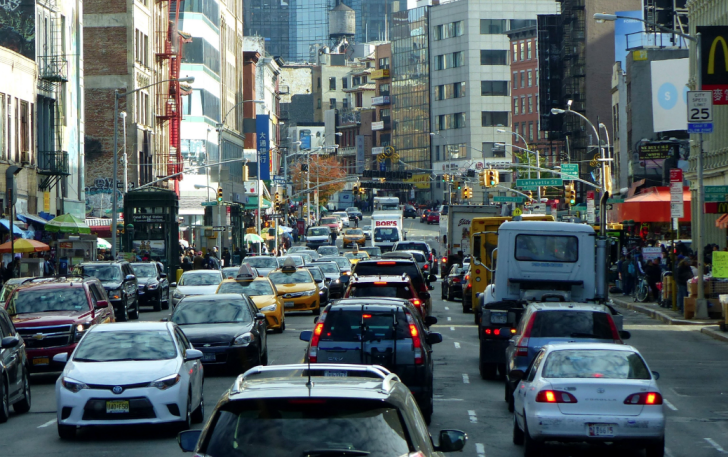It's hot. How hot? So hot that the mayor canceled his out-of-town presidential campaign appearances to be on hand to manage the disaster. That's hot. So hot that the mayor is telling everyone to skip all-but-essential activities. But it's not hot enough — it seems it's never hot enough — for the city to tell people to stop using their emissions-spewing cars to damage our lungs and heat up our air.
Earlier this week, Mayor de Blasio summoned the press corps to his emergency management bunker in Brooklyn Heights to send the dire warning about Saturday's heat: stay home and set the air conditioner to 78 degrees, he said. Avoid the subway, he said. Drink plenty of water (no coffee or beer!), he said.
What he didn't ask people to do was stop driving cars.
It's part of a pattern that the city government has found itself in when it comes to extreme weather and driving. In instances like thunderstorms or blizzards, where there are clear threats to a driver's ability to operate a car safely, the mayor asks motorists to stay off the roads. But on hot days with poor air quality, there's never any suggestion that New Yorkers limit their driving to make life easier (and incrementally cooler) for their neighbors, even when the Department of Health clearly notes that the air quality is poor enough that people should limit physical exertion.
The city is aware, after all, that congestion is a major factor on the overheating Earth and on worsening air quality. According to the city's own numbers, transportation is responsible for 30 percent of the city's greenhouse gas emissions, and the raw amount is rising. New Yorkers drove more than 20 billion miles in 2017 — an increase from the previous year that put 12,456,065 million metric tons of carbon dioxide into the air. That's a lot of noxious gas — and hot air.
Even from the mayor.
"It's irresponsible," said Joe Cutrufo of Transportation Alternatives, referring to the lack of mayoral guidance on driving. "The mayor won't hesitate to tell New Yorkers not to drive when there's a snow storm. Why should it be any different poor air quality days?"
Other local governments don't seem to have a problem suggesting their citizens shouldn't drive, despite the fact that they lack New York's public transportation options. City officials in Croton-on-Hudson and (full disclosure, this reporter's hometown of) Long Beach have responded to recent air quality and heat advisories by discouraging solo driving trips.
"Driving may be one of the most polluting activities that people do on a daily basis, so we encourage everyone to avoid unnecessary driving," Croton-on-Hudson's government told residents in response to a late-June heat advisory.
In contrast, a de Blasio merely said, "If you don't need to go somewhere, don't go somewhere." A spokesperson suggested that Hizzoner's advice applies to all forms of transportation, including driving. But the mayor missed a chance to specifically tell people not to drive.
"It's not like this is a typical American city. The vast majority of us don't rely on a car for day-to-day transport, yet our leaders won't even suggest that maybe driving isn't such a good idea, even on days when our health is at risk," Cutrufo said.






